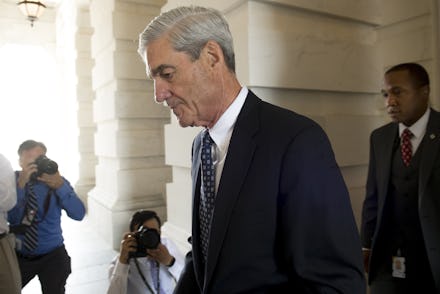Yes, Donald Trump can fire Robert Mueller. Here’s how he can do it.

Can President Donald Trump fire Robert Mueller? It’s a question that’s hovered over Mueller since May, when he was appointed special counsel to investigate possible ties between members of Trump’s election campaign team and the Russian government.
While Trump has called the investigation a “witch hunt,” the White House has maintained that the president won’t fire Mueller, even though he has the right to do so.
But the New York Times reported that the White House is investigating Mueller and his team in an effort to build a case to fire Mueller or force some of his aides to recuse themselves.
So, can Trump fire the special prosecutor who was appointed to investigate him and his campaign’s connections to Russia? The short answer is yes, but it would be difficult.
The rules governing the hiring and firing of special counsels were drafted in 1999, near the end of former President Bill Clinton’s second term in office. They make clear that only the attorney general can remove the special counsel from office.
Since Attorney General Jeff Sessions recused himself from the Russia investigation in March, the acting attorney general for the purposes of the investigation is Rod Rosenstein.
Rosenstein, then, is the only person who could fire Mueller — and he’s defended that interpretation of the regulations: “The chain of command for the special counsel is only directly to the attorney general — and in this case, the acting attorney general,” Rosenstein said before a Senate subcommittee in June.
But the regulations say he can only do so for “good cause,” which explains why Trump’s team is reportedly looking for dirt on Mueller. If he can find a way to show that Mueller is unfit to be special counsel, Trump can legally demand that Rosenstein fire Mueller, and Rosenstein would have no reason to refuse.
But if Trump can’t find a good reason to fire Mueller, things become much more complicated for him.
Without cause, Trump can still demand Rosenstein fire Mueller, but Rosenstein has said he would refuse such an order. “The regulation provides that a special counsel may be removed only for good cause, and so it doesn’t matter who gives me an order, what that order is; if there isn’t good cause, I would not fire the special counsel,” Rosenstein testified during the June Senate subcommittee hearing.
Trump, then, would have to fire Rosenstein, in which case Associate Attorney General Rachel Brand would become acting attorney general for the Russia investigation. Trump would then have to ask Brand to fire Mueller. If she refused, Trump would have to fire Brand and all subsequent interim replacements until he found someone willing to can Mueller. Such an event would echo the notorious 1973 “Saturday Night Massacre” in which former President Richard Nixon fired the special prosecutor who was investigating the Watergate break-in after his attorney general and deputy attorney general refused to do so and resigned.
But if Trump couldn’t find anyone in the Justice Department willing to fire Mueller, he still has one additional option to rid himself of the special counsel. In May, Neal Katyal, a Georgetown law professor and former acting solicitor general who helped draft the special counsel regulations in the 1990s, wrote in the Washington Post that Trump could simply order the regulations rescinded — since they’re merely regulations and not laws. Trump would not have to ask Congress for permission to change them, in which case, he could fire Mueller himself.
Of course, any of the above moves would have political repercussions. Both Republicans and Democrats have warned Trump that firing Mueller could mean his impeachment, and firing the special counsel tasked with investigating his campaign’s ties to Russia would do nothing to squash talk that Trump and his associates could have colluded with the Kremlin to win the election.